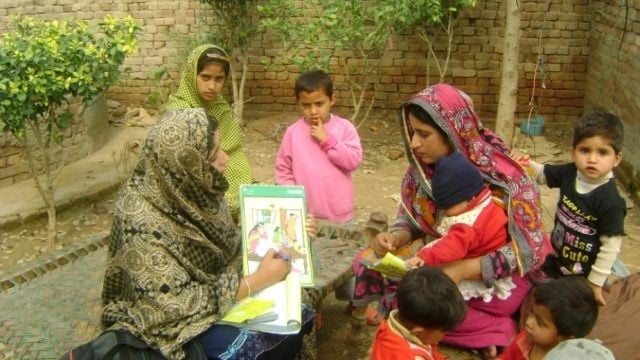
The population welfare department in KP has coverage of about 30 per cent whereas the health department has 60 per cent coverage with 1,300 basic health units in the province

Pakistan Health and Demographic Survey, 2013 suggests that 98 per cent families in Khyber Pakhtunkhwa are aware about the need for population planning. Out of these, 28 per cent people use family planning techniques but their needs cannot be matched due to non-availability of enough contraceptive facilities.
The survey also indicates that the Mother Mortality Ratio (MMR) has decreased from 275 deaths per 100,000 in 2006-2007 to 206 deaths per 100,000 pregnant women in 2013. Currently, 1,700 women die each year during pregnancy in Khyber Pakhtunkhwa.
Gohar Zaman, Regional Director Rahnuma Family Planning Association of Pakistan, KP region says that 61 per cent females visited doctors during pregnancy for anti-natal care.
"The average number of children a woman has come down from 4.25 to 4 in 2013. Similarly, the Infant Mortality Ratio (IMR) in the province has decreased from 63 per 1,000 in 2006-2007 to 58 per 1,000 in 2013. However, the number of children dying during birth has remained the same, at 41 per 1,000 per year," Zaman adds.
He says the traditional techniques bypass the use of modern contraceptive measures as most people practise old methods. "However, the health and demographic survey recorded one per cent increase in the use of modern techniques as in 2013, the modern ways accounted for 20 per cent of contraceptive measures in KP," he informs. Furthermore, seven out of 10 females and six out of 10 men in KP want to have a reasonable gap between children.
Read also: Planning in Balochistan
With an increase of 100 new facilities in the past two years, the Population Welfare Department (PWD) KP has now 632 Family Welfare Centres (FWC) in the province where families interested in family planning are educated about different means and methods of family planning. These centres also provide information about reproductive health matters, free medicines for common ailments, anti-natal and post-natal checkups, and nutrition guidance besides providing various contraceptives at subsidised prices.
Dr Najma Sultana, Director Technical PWD KP, argues that communicating awareness and services through mass media campaigning, male/female motivators, satellite camps and mobile service units is resulting in increased consciousness about the need for adopting family planning techniques.
"Each male or female motivator is responsible for spreading family planning information among 5,000 to 7,000 persons. These motivators also provide subsequent injectable doses, pills and condoms to families," Sultana informs.
Similarly, these motivators inform their population of concerns about the dates and venues of satellite camps in an area. "The satellite camps are set up every month to provide family planning facilities for up to 15,000 people. These camps also provide Intra Uterine contraception along the provision of other contraceptive facilities," she adds.
The PWD also has a setup of 34 Mobile Service Units at the tehsil level and each of them organised 12 camps per month. However, finding women medical officers for such structures is an issue as female doctors are not attracted to working in camps in rural areas.
"We are trying to deal with this issue by building the capacity of female field technical officers, who are well trained in dealing with matters related to family planning, except performing surgeries," She says.
More family planning facilities, including surgeries and contraceptive implants, are provided at the Reproduction Health Centres in the district headquarter hospitals and tehsil headquarter hospitals where female medical officers of grade 17 and 18 are responsible for the procedures.
The PWD is also responsible for training of doctors, paramedics and health personnel associated with NGOs. It has established three training institutions at Peshawar, Abbottabad and Malakand where females with at least 10 years of schooling in science subjects and 45 per cent marks are enrolled.
Currently, there are 44 girls getting the basic training in two batches at a centre in Peshawar. At the temporarily rented facilities in Abbottabad and Malakand, 22 girls each are getting training," Sultana says.
Donors at the Family Planning 2020 summit in London in 2012 urged Pakistan to increase its national Contraceptive Prevalence Rate (CPR) from 35 per cent to 55 per cent by year 2020. The KP’s share is to increase its CPR from 28.1 per cent to 42 per cent by 2020.
Dr Najma Sultana argues that this goal is achievable if the health facilities of the provincial health department were utilised for the purpose of family planning.
"The PWD has a provincial coverage of about 30 per cent whereas the health department has 60 per cent coverage with 1,300 basic health units in the province. If they are involved in family planning, the access to contraceptives will be doubled within a short time," she claims.